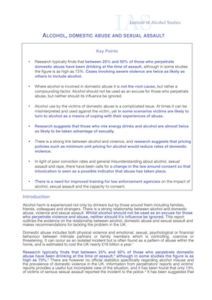View this report

Key Points
- Research typically finds that between 25% and 50% of those who perpetrate domestic abuse have been drinking at the time of assault, although in some studies the figure is as high as 73%. Cases involving severe violence are twice as likely as others to include alcohol.
- Where alcohol is involved in domestic abuse it is not the root cause, but rather a compounding factor. Alcohol should not be used as an excuse for those who perpetrate abuse, but neither should its influence be ignored.
- Alcohol use by the victims of domestic abuse is a complicated issue. At times it can be misinterpreted and used against the victim, yet in some scenarios victims are likely to turn to alcohol as a means of coping with their experiences of abuse.
- Research suggests that those who mix energy drinks and alcohol are almost twice as likely to be taken advantage of sexually.
- There is a strong link between alcohol and violence, and research suggests that pricing policies such as minimum unit pricing for alcohol would reduce rates of domestic violence.
- In light of poor conviction rates and general misunderstanding about alcohol, sexual assault and rape, there have been calls for a change in the law around consent so that intoxication is seen as a possible indicator that abuse has taken place.
- There is a need for improved training for law enforcement agencies on the impact of alcohol, sexual assault and the capacity to consent.
View this report
